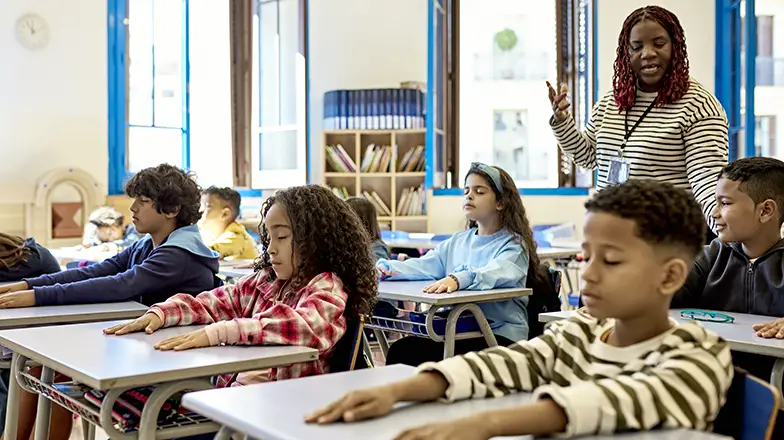Mental Health Matters: Linking Education and Behavioral Health

Of the multiple factors contributing to positive, equitable health outcomes for children, education is in the top tier. In the years during and following the pandemic, educators and health providers have seen even more clearly the impacts of behavioral and mental health and wellness on children’s educational success.
According to the Children’s Hospital Association, from April to October of 2020 mental health emergency department visits increased 24% for children ages 5-11 and 31% for those ages 12-17 compared to the same period in 2019. These statistics show the need for expanded behavioral health services for children and families while school is both in and out of session.
It’s a key focus area for BJC HealthCare. Teams throughout the health system already work in local schools to provide mental health services for children during and beyond the school year. These include efforts like BJC Behavioral Health’s Embedded School program, a partnership with St. Louis County Children’s Service Fund and various St. Louis County school districts. Through the program, a team of educational support counselors are embedded in certain schools to support short-term mental health needs of students from preschool through grade 12. Additionally, community support specialists work year-round to support behavioral and mental health needs for children and families, both in schools and in home and family settings.
“These services are prevention and early intervention efforts,” said Candace Hamell, associate director of child and young adult services at BJC Behavioral Health.
Beyond the classroom: community efforts to sustain mental health
Additionally, BJC School Outreach and Youth Development provides programs for youth and adults that promote mental and physical wellness both in schools and communities. The school-based programs are designed to meet Missouri and Illinois academic health guidelines, while the community-based programs are co-created and co-designed to support “out of school time” learning.
And efforts to expand behavioral health services across the community have become paramount for the health system. BJC has partnered with community-based organizations to develop wellness hubs to ensure equitable access to behavioral health support year-round. These community wellness hubs can serve as central locations for holistic — mental, physical and spiritual — wellness, offering crucial wraparound services and meeting people in already trusted community organizations and institutions while prioritizing overall well-being.
“We are highly focused on increasing the community behavioral health programs year-round,” said Doneisha Bohannon, director of community health partnerships and collaboration for BJC HealthCare.
Her team is collaborating with St. Louis County libraries as well as some of the city recreation centers to bring behavioral health wellness programs on site in underserved neighborhoods. Topics offered in the hubs include yoga, stress management, meditation, self-care, food and nutrition and bullying prevention. Programs are designed based on insights from community residents and community organizations.
“We are intent on meeting people where they are and delivering programs that they want to see,” Bohannon said, adding that they are working with schools to identify other areas of need.
Over the past year, three community wellness hubs were established at the St. Louis County Library’s three North County locations — Lewis & Clark, Parkview and Natural Bridge — as well as two additional locations at Wohl Recreation Center and Marquette Recreation Center. The partnerships allow BJC and its community partners to enhance the work that’s already in progress through each organization.
“Tons of kids are coming through recreation centers, so we want to build on what they’re already doing,” said Denise Strehlow, a manager on BJC’s Community Health Improvement team.
Best of all, the hubs are for anyone in the community — and the response has been positive, Strehlow said. “The feedback is helpful — we’re getting direct input from the community so we’re creating what people want.”
Hamell said her team at BJC Behavioral Health acts as a liaison to the Community Health Improvement team to organize, design and implement the programs. They are also able to tell their clients about the hubs so they can get that extra support outside of the services the clinicians provide.
“We can provide helpful input on where and how to provide community-based services where people naturally go,” she said. “It’s a nice continuum of care through the BJC system of programs that fit in different departments and reach people through different channels.”
Recent News
News
Parkland Health Center Ceremony for New Medical Office
News
Parkland Health Center Opens Family Care Pharmacy
News
Parkland Health Center Recognized by U.S. News Among Best Hospitals
News
PHC Designated as a Birthing-Friendly Hospital with CMS
News
U.S. News & World Report Rankings for Christian Hospital 2023-24
News